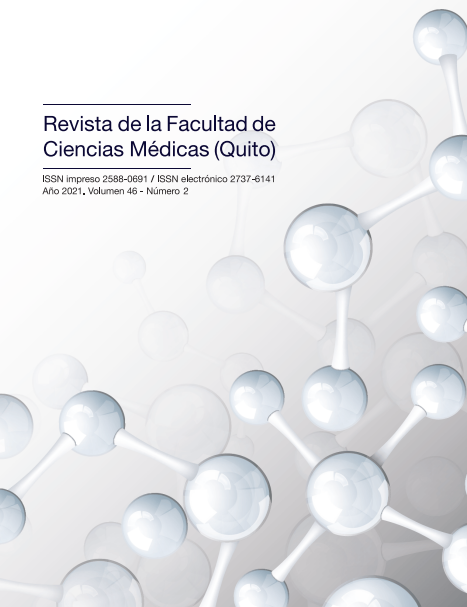La Ultrasonografía anal en el seguimiento y evaluación postoperatoria de malformaciones anorectales
DOI:
https://doi.org/10.29166/rfcmq.v46i2.3033Palabras clave:
pediátrico, ecografía, malformación anorrectal, anorrectoplastiaResumen
Objetivos: Describir la ecografía anal en el seguimiento de malformaciones anorrectales.
Material y Métodos: estudio descriptivo y retrospectivo de pacientes diagnosticados y/o intervenidos de malformaciones anorrectales, evaluados por ecografía anal, entre 2016-2017. Empleamos un transductor de 10 megahercios, identificando la anatomía del canal anal alto, medio y bajo.
Resultados: Se incluyeron ocho pacientes, 5 hombres y 3 mujeres, con una media de 8,37 años (rango, 3-11). Tres pacientes tenían diagnóstico de ano anterior (no operados previamente). Se intervinieron 5 pacientes: 2 presentaban fístula recto-uretral, 1 fístula recto-vesical, 1 recto-vestibular y 1 fístula perineal.
Los hallazgos ecográficos más significativos fueron: ausencia parcial de la parte anterior del esfínter externo, hipertrofia del esfínter interno en el canal medio en un paciente; y ausencia de esfínter interno en el canal medio y alto más ausencia de esfínter externo en la región anterior, en un paciente con incontinencia clínica, ambos pacientes previamente diagnosticados de ano anterior que posteriormente fueron intervenidos.
Conclusiones: La ecografía anal es un método no invasivo, económico, factible de realizarse sin anestesia y ofrece una información anatómica útil para establecer la mejor opción terapéutica. Su principal limitación es la imposibilidad de realizarlo en pacientes menores de 3 años.
Descargas
Métricas
Citas
Cho S, Moore SP, Fangman T. One hundred three consecutive patients with anorectal malformations and their associated anomalies. Arch Pediatr Adolesc Med. 2001; 155: 587-91
Holschneider A, Hutson J, Peña A, et al. Preliminary report on the International Conference for the Development of Standards for the Treatment of Anorectal Malformations. J Pediatr Surg 2005; 40: 1521–6.
DeVries PA, Peña A. Posterior sagittal anorectoplasty. J Pediatr Surg 1982; 17:638–43.
Borg HC, Holmdahl G, Gustavsson K, et al. Longitudinal study of bowel function in children with anorectal malformations. J Pediatr Surg 2013; 48: 597–606.
Schmiedeke E, Zwink N, Schwarzer N, et al. Unexpected results of a nationwide, treatment-independent assessment of fecal incontinence in patients with anorectal anomalies. Pediatr Surg Int 2012; 28: 825–30.
Stenstrom P, Kockum CC, Emblem R et al. Bowel symptoms in children with anorectal malformation – a study with a gender and age perspective. J Pediatr Surg 2014; 49: 1122–30.
Bhutani MS. Recent developments in the role of endoscopic ultrasonography in diseases of the colon and rectum. Curr Opin Gastroenterol 2007; 23: 67–73.
LeBlanc JK. Imaging and management of rectal cancer. Nat Clin Pract Gastroenterol Hepatol 2007; 4: 665–76.
Saranovic D, Barisic G, Krivokapic Z, et al. Endoanal ultrasound evaluation of anorectal diseases and disorders: techniques, indications, results and limitations. Eur J Radiol 2007; 61: 480–9.
Morinville VD, Paquin SC, Sahai AV. Safety, feasibility, and usefulness of rectal endoscopic ultrasonography for pediatric anal and perianal complaints. J Pediatr Gastroenterol Nutr. 2010; 51: 93-5
De la Portilla F, López-Alonso M. Endosonography of the anal canal: findings in children. Diseases of the Colon & Rectum. 2009; 52: 711-4.
Caldaro T, Romeo E, De Angelis P, et al. Three-dimensional endoanal ultrasound and anorectal manometry in children with anorectal malformations: new discoveries. J Pediatr Surg 2012; 47: 956–63.
Wang Z, Hu L, Jin X, Li X, Xu L. Evaluation of postoperative anal functions using endoanal ultrasonography and anorectal manometry in children with congenital anorectal malformations. J Pediatr Surg. 2016 Mar;51(3):416-20. doi: 10.1016/j.jpedsurg.2015.09.024.
Stenström P, Hambraeus M, Arnbjörnsson E, et al. Pelvic floor in females with anorectal. malformations - findings on perineal ultrasonography and aspects of delivery mode. J Pediatr Surg. 2015; 50: 622-9.
Descargas
Publicado
Cómo citar
Número
Sección
Licencia
Derechos de autor 2021 GRECIA VICTORIA VIVAS COLMENARES, María J. Moya Jimenez, Rocío Granero Cendón, Manuel López Alonso

Esta obra está bajo una licencia internacional Creative Commons Atribución-NoComercial-SinDerivadas 4.0.











